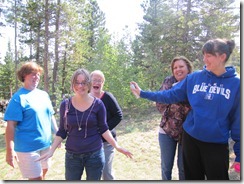 |
| Margie and I dancing before headin' to the airport |
Merry Christmas! Whoa – wait… it’s not Christmas yet... but it sure does feel like it! I’ve got an awesome treat for you guys today! Not only do I have the wonderful and amazing
Margie Lawson here with an awesome guest post about NYT writing, but I’m also guest blogging at
two blogs today! I’m sharing my experience, the takeaways, and the lessons I learned while in one of
Margie’s Immersion Master Classes!
And we’re calling it The Margie Lawson Triple Blog Extravaganza!
Part One of my Immersion Master Class experience is at
Jami Gold’s blog, and Part Two is with Angela Ackerman at
The Bookshelf Muse blog.
Oh! And before you get going, allow me to let you in on a little something: Margie’s giving away
three exciting gifts during this extravaganza! Woo hoo!!! See? It’s like Christmas in September!
Here’s a breakdown of prizes for the Triple Blog Extravaganza:
All you have to do is comment! That’s THREE chances for you to win and learn how to pack a powerful, emotional punch and deep edit for NYT writing in your WIP!
Buckle up and get ready to comment so you can grab a seat and be a graduate of one of Margie’s courses!
Take it away, Margie….
*****
A huge heartfelt hug to Melinda Collins for writing the blogs about my Immersion Master Class and setting up the Triple Blog Extravaganza!
Visit all three blogs today! You have three chances to be a WINNER today!
Dig Deep for NYT Writing!
By Margie Lawson
Writing is hard, hard, hard.
Digging deep to write fresh is harder, harder, harder.
It’s dig-to-China-with-your-pinkie harder.
Each time you write, you have the opportunity to write something in a way that has never been written by anyone else.
You may describe a feeling in a way no one else ever thought to describe that feeling. And the way you write it may resonate with thousands, or tens of thousands who read your words.
The passage below is from a Margie-grad, Lisa Wells, the author of Dibs. She’s taken all my writing craft classes and attended a four-day Immersion Master Class in my home in June. I have her permission to share this excerpt she deep edited in Immersion class.
Lisa Wells, excerpt from The To Do List.
The sound of children laughing pulled her out of her daze. She glanced toward the playground. Small children: round, skinny, short, tall, were climbing, swinging, sliding, hiding on the same equipment she’d once played on. To the casual observer, they were normal children.
But she wasn’t casual and they weren’t normal.
She didn’t need to be a doctor to know if you took an x-ray of their childlike bodies, you’d see loneliness lining the inside of their laughter and caution patrolling the outside of their hearts.
You’d see a trash bag full of rotting hope at the bottom of their bellies, and an old tattered bag of self-esteem on broken-down shelves.
You’d see the hardened hearts of the older orphans tattooed with name-calling graffiti. Words like unloved, unwelcomed, unliked, unwanted permanently etched in pain.
And you’d see their memories of the families who came looking for a child and didn’t choose them…and didn’t choose them….and didn’t choose them.
And that’s not all you’d see.
BLOG GUESTS: That’s fresh writing. That’s NYT writing.
Every time I read that passage it gives me visceral responses.
Kudos to Lisa Wells.
NYT writing doesn’t have to be long. It may be a short sentence.
It may be what I call a SAP. Short And Powerful.
The sinking feeling bottomed.
I know that feeling. I know what that character is feeling.
But I’ve never seen that feeling written with those four words. Ever.
It’s a SAP. Short And Powerful.
Here’s another short sentence that grabbed me. It seems like a simple sentence, but it carries power. It’s by another Immersion grad, Bernadette Hearne.
Bernadette Hearne, from her WIP, Traitor to Love.
Sally hovered in the doorway, bearing a tea tray and a scowl.
That sentence is an example of one of the thirty rhetorical writers I cover in my Deep Editing course. It’s a zeugma. You’ve got to love anything called a zeugma! J
Here’s another zeugma. This one is from Suzanne Turner, who is a multi-Margie grad, and a two-time Immersion Master Class grad.
Suzanne Turner, from her WIP, The Lost Chord
His voice was low and rough, filled with the promise of a new puppy, or the moon, or an apology.
Ah – That zeugma is in a dialogue cue.
Here’s another example of zeugma in a dialogue cue. It’s from Joan Swan, another Margie grad. Joan Swan is a multi-Margie grad, a two-time Immersion Master Class grad, and a three-time Golden Heart nominee.
Joan Swan, from book 3 in the Phoenix Rising series, to be released in 2013.
“Come on, baby.” He crooned the words in a voice that should have been outlawed. Deep and smooth and so damn sexy.
Joan’s example includes another rhetorical device too.
Polysyndeton: Deep and smooth and so damn sexy.
Joan created what I call poly-zeugma. A rhetorical device combo. Smart! And smooth too.
If you’re still not sure what a zeugma is, I’ll share one more example. It’s one I made up for teaching purposes.
Margie grabbed her purse, her keys, and her steely resolve.
Now – I bet you know how to write a zeugma. :-)
What contributes to NYT writing?
Using style and structure and thirty-plus rhetorical devices.
Thinking like a psychologist. Knowing the nuances of writing craft.
I teach six different writing craft courses and each course is loaded with dozens of Deep Editing techniques that teach writers how to add power to their writing.
Yep. Each course is full of DOZENS of psychologically-based deep editing tips and techniques.
Here’s a sample. It’s just a sample.
Power words. Visceral responses. Fresh writing. Cadence. Cadence. Cadence. Fresh writing. Varying length of sentences. Avoiding Telling Tags. Fresh writing. Body Language. White space. Avoiding Linear Load Issues. Dialogue Cues. Fresh writing. Avoiding clichés. Kissing your as’s goodbye. Natural sounding dialogue. Fresh writing. Tracking senses. Keeping your voice strong and fresh. Nixing echo words. Assessing flow. Clarity. Clarity. Clarity. Humor Hits. Fresh writing.
Working harder.
Digging deeper.
Making words and phrases carry triple their weight.
Writing a non-POV character’s description so expertly, that your POV character’s attitude toward that character is clear, and powerful. But conveying that attitude just through the description.
Nixing all the mundane.
Crafting every sentence to propel the reader into the next sentence. And the next. And the next.
Writing so agents and editors and reviewers and readers will never want your book to end.
I could share hundreds of NYT examples, just from a few groups of Immersion grads, or from on Fab 30 course.
My apologies to all the mega-talented Margie grads I didn’t have an opportunity to spotlight in this blog. You all know your writing impresses me. I trust that your writing will impress agents and editors too.
I’ll share one more example. This one is from multi-Margie-grad, and Immersion grad, Melinda Collins.
I surprised Melinda. She didn’t know I planned to use an example from her WIP. When she reads this, I bet she gets a visceral response!
Melinda worked on this piece in Immersion class. She also tweaked it with the help of her Editing Partner and Immersion sister, Samantha Leach.
Melinda Collins, from her WIP, Destiny Awakened
At fourteen, I realized he wasn’t the man I once knew. It felt like he turned into a mad scientist and forgot all about the daughter he left behind. So I cut him out of my life and buried those memories deep. Mammoth cave deep. Grand Canyon deep. But my traitorous brain ambushed me and they were exhumed. And with each stab, the shovel pierced my scarred-over heart.
NYT Beautiful.
Margie-grads: What rhetorical devices did Melinda use?
I’ll share one, Margie-grads share one.
Parallelism: So I cut him out of my life and buried those memories deep
The examples in this blog share fresh psychologically empowered writing. NYT writing. It’s cotton-candy-on-your-tongue writing. It makes the reader want more and more and more.
My online courses are loaded with tips and techniques for how to dig deep. How to write fresh. How to add power to every page, every sentence. Please drop by my web site and check out my courses, and the full line-up of courses offered by Lawson Writer's Academy.
I’ll post the names of the winners on the blog on Wednesday, between 12:00 and 12:30PM Mountain Time.
Lawson Writer's Academy now has 37 courses and 12 instructors. LWA courses are taught in a cyber classroom from Margie’s website, www.MargieLawson.com.
The first three courses just started. Registration is open through Friday.
Instructor: Lisa Miller
Instructor: Shirley Jump
Instructor: Suzi Lazear
Instructor: Margie Lawson
*****
Margie Lawson —psychotherapist, editor, and international presenter—developed innovative editing systems and deep editing techniques used by writers, from newbies to NYT Bestsellers. She teaches writers how to edit for psychological power, how to hook the reader viscerally, how to create a page-turner.
Thousands of writers have learned Margie’s psychologically-based deep editing material. In the last seven years, she presented over seventy full day Master Classes for writers in the U.S., Canada, Australia, and New Zealand.
Please contact Margie if you think your group might be interested in having her present a master class for them.
For more information on Lawson Writer’s Academy, lecture packets, full day master classes, and the 4-day Immersion Master Class sessions offered in Margie’s Colorado mountain-top home, visit: www.MargieLawson.com.
*****
Melinda here! WOW! WOW! WOW! Now we ALL know what to strive for: NYT Writing!!!
Oh my goodness, I cannot tell you how much my writing has changed since having taken one of Margie’s classes! And it’s not just my writing itself, it’s my writing process, my thinking process, my editing process. ALL of it has changed! And ALL of it for the better! I am a stronger, more confident writer thanks to the time I’ve spent learning from her, and I do hope that you get the chance to learn from her as well!
And DOUBLE oh my goodness! Margie certainly surprised me by using that example from my latest WIP! *happy dance happy dance* Thank you, Margie! YES, I had a visceral response! *BIG grin* And thank you to ALL my immersion sisters for all of your support during and since our Immersion Master Class!
Whew! Okay, so don’t forget, Margie’s giving away one online class here, a lecture packet at Jami’s blog with
Part One of my Immersion Master Class post, and another lecture packet at The Bookshelf Muse blog with
Part Two of my Immersion Master Class post. Just leave a comment to enter!
The winners will be decided/announced by Margie on Wednesday, September 5th (tomorrow)!
Good luck and Happy NYT Writing!!












